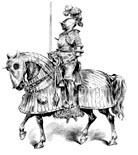
Overcoming Opposition From Within & Without
'THIS IS A TIME FOR FIGHTERS'
Fr. Eduard Perrone remembers aspiring to be a priest in his early grammar-school days, but by the time the ambitious Detroit native reached junior high, he had pretty much abandoned the idea in favor of a career as a professional musician. But even in his music, he was never far from the heart of the Church. In fact, it was in part the Church’s traditional liturgical music that later inspired him to return to his childhood aspirations.
Music was a family love and even a family business for the Perrones. Eduard’s father, Philip, was a trumpeter and owned a music store when Eduard was a boy. His mother, Maria, played piano, the instrument he grew up playing and loving. In high school, he studied music at Cass Technical, a centralized public school in downtown Detroit, an institution that would now be called a magnet school. “Any student who excelled in one discipline could attend Cass and consort with other kids who were gung-ho on a subject or a career,” he explains. “It made for a great feeling of solidarity and healthy competition with high standards.”
At the same time, the young Perrone was intimately involved at his parish, St. Clare of Montefalco in Grosse Pointe, just outside the Detroit city limits. “I served as an altar boy and sang in the choir. Being involved in music was just natural for me,” Fr. Perrone says. From eighth grade through high school, he also attended the Palestrina Institute, a music program offered by the Detroit Archdiocese. “It was exceptional,” he says of the five-year program. It was at the Palestrina Institute that Fr. Perrone first took courses in music theory, harmony, and ear training. He learned choral singing, Gregorian chant, and organ. “It was tremendous,” he recalls. “They turned out generations of talented church musicians.” Sadly, the Institute closed a few years after Fr. Perrone graduated from high school in 1966.
From there, he continued his pursuit of a career as a musician. He received a scholarship from the University of Louisville and continued his study of piano and composition, receiving a degree in Music Theory and Composition. As he did at Cass Tech, Perrone continued playing in an orchestra at college and remained involved in Church music, playing scores from great Church musicians such as Bach and Mozart.
He first seriously felt his call to the priesthood during is senior year at Louisville. “I remember,” says Fr. Perrone, “it was like a revelation. It was a totally uninvited and unreflective thought. I remember thinking, ‘I know what I’m going to do. I’m going to be a priest.’ It was in the evening just before I went to bed, and the thought filled me with such happiness. It was something I hadn’t considered in years. It came to me, and I slept so well that night. But when I woke up in the morning, I said to myself, ‘Wasn’t that a stupid idea I had?’ But something happened there that night.”
You May Also Enjoy
Reviews of Dangerous Diplomacy: The Story of Carl Lutz, Rescuer of 62,000 Hungarian Jews... From Rage to Responsibility: Black Conservative Jesse Lee Peterson and America Today
The proper integration of science into Catholic culture requires a full understanding of how science relates to a complete view of faith and of the world.
Our letters to the editor section has always been lively, and we are grateful to…

